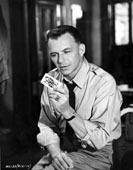
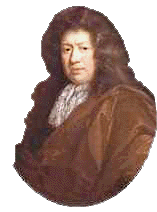
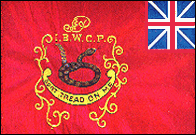
To Fairview Park, to witness a truly great moment in decisive, executive-led, people-based government. It is a while since I visited this otherworldly residential area, with its concentric rings of roads and almost toy-like houses in which everything – the height of ceilings, the width of doors, the ambitions and achievements of the inhabitants – are two-thirds the size of those elsewhere. The last time I was here for any length of time was when it was a new development, and someone invited me to a barbecue in their snake-infested, 10-foot by 12-foot backyard at Unit 17, Street B, South Zone 3, Alpha Sector. My main memory is a drunken Royal Air Force dental clerk based somewhere in the nearby New Territories wilds causing great distress by proudly reciting a painstakingly acquired range of perfectly enunciated Tagalog obscenities to the host’s virtuous and God-fearing Filipino wife.
Today, the community has a bigger problem. Nearby villagers, proud descendents of the tribes of Neolithic cannibals from whom the British took the land north of Kowloon in 1898, make a living in some sort of way that requires 10-ton trucks to hurtle in and out. The faster the hurtling, the more money they make. The trucks’ optimum route involves a shortcut through an idyllic neighbourhood of Fairview Park, which occasionally (but not all that often, really), ends with a local child being mangled up by a heavy goods vehicle’s rear axle.
This is obviously a job for big, tough, no-nonsense governance of the sort at which Chief Executive Donald Tsang excels. His officials have two options.
1. Announce to the families of Fairview Park that they must accept the fact that from time to time some of their offspring will be run over and killed by the trucks. Unlike them, the villagers have representation in the Chief Executive Election Committee, so their business interests outweigh any value the families might attach to the lives of their children, which – unlike fleeting opportunities to make a profit – can probably be replaced.
2. Declare the road in question off-limits to trucks. Erect a sign advising drivers of this, and enforce the regulation through police spot-checks, cameras and/or citizens’ volunteer patrols. After a sufficient number of truck drivers are fined a few thousand dollars for using the shortcut, they will find it makes more economic sense to use the longer route. Publicly shame the villagers into admitting that children’s lives are more important than money.
Torn between these two diametrically opposing choices, Hong Kong officials seize up. Choose one option, and every decent, sane person in the city will be upset. Choose the other, and the triads, village chiefs and patriotic Heung Yee Kuk clansmen will be outraged. But look – what’s that in the sky coming to the rescue? Is it a bird? Is it a plane? No! It’s Transport Department Spokesman Man! With his cape flapping in the Yuen Long breeze, the masked crusader stands before the conflicting groups and boldly declares…
“We knew that the local people had different views over the road use of Fairview Park Boulevard, hence, it is necessary to clarify the relevant issue.”
And with that, he turns and soars away through the air back to Central. Another problem solved, thanks to the steely determination of Transport Department Spokesman Man!
Tue, 13 Mar
The morning starts with two steaming bowls of finest Foreign Correspondents Club chicken and mushroom congee and conversation with shapely Administrative Officer Winky Ip. The delectable civil servant tells me that a colleague of hers, one of the visionary aesthetes that make our Planning Department the envy of the world, is about to start an exciting new project. Out of politeness, I ask what it is. My bureaucrat buddy stirs her juk and looks at it for a few seconds. “Cruds!” she exclaims. I examine a spoonful of mine. It looks fine.
“You can always send it back,” I suggest.
She shakes her head. “No, I mean my friend Leaky. That’s what she’s going to be working on – the Central Reclamation Urban Design Study. CRUDS.” In particular, I learn, Leaky will be responsible for ensuring a legible transport network. It all comes back to me.
“Oh that’s the girl you worked with in the Anti-Pedestrian Unit at the Transport Department all those years ago.”
“That’s her,” grins Winky. ”She’s a genius. There’s a place in Sham Shui Po where a four-lane highway divides a housing estate from all the shops. She designed this barrier and footbridge system that forces people to walk 400 yards out of their way to go to the market! Amazing. And she calculated that if they narrowed all the sidewalks in Soho down to about two feet, so they only accommodate people walking in single file, they could create parking spaces for several dozen SUVs and Mercedes in each street. She won an award for that. The public consultation was amazing, too. They posted the statutory announcement and request for feedback on a noticeboard in a gully full of giant spiders on Po Toi Island. In Swedish. For three hours. That was how she got involved with CRUDS. They transferred her to the… what was it called? Oh yes – the Central Reclamation Area Plan.”
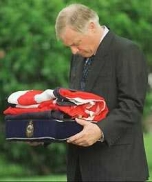
“Stop asking for democracy and shut up about politics generally, otherwise we won’t hand you goodies on a plate any more and then you’ll be marginalized.” So runs today’s friendly greeting to Hong Kong from National People’s Congress Standing Committee Vice-Chairman Cheng Siwei. This comes just days after People’s Bank of China’s Governor Zhou Xiaochuan announced that Beijing will enhance Hong Kong’s role as the country’s international financial centre.
As we approach the 10th anniversary of the return of the Big Lychee to the glorious motherland, curious people overseas are going to ask what has changed. And perhaps this is the biggest transformation, though it has been subtle and masked by the economic and other traumas inflicted on us in the time of Tung Chee-hwa, the first Chief Executive, whose idea of leadership was to do a dazzlingly convincing impression of a panic-stricken headless chicken running around wetting itself.
Before Tung, Hong Kong made its own way in the world. Today, we owe any prosperity that comes our way to the kindness of the Communist Party. Before 1997, we assumed market forces would shape the economy. Today, we accept that local or Beijing officials choose which industries we will have. Under the British, to the extent we bothered even thinking about Singapore or Shanghai, we laughed about how we pissed all over them. Under China, we are petrified that Lee Kwan-yew’s Zombie Island or Pudong’s Potemkin financial hub will overtake us. Back then, we shrugged at overtures from grubby provincial and county cadres hoping to get their hands on our wealth. Now, our top officials fall over themselves to thrust their tongues up Mainland counterparts’ backsides in order to further integration, cooperation and partnership. And the sky was blue. And you could sometimes see stars at night.

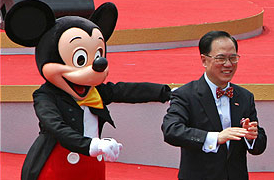
After reading Sylvia Townsend Warner’s The Corner That Held Them until sleeping at 3am, I am gently eased into wakefulness by RTHK3. In between exhaustive accounts of Italian soccer games and stentorian admonitions on gum care, the station rouses me with glimpses of a world of surprises and contradictions.
In London, the House of Commons votes in favour of modernizing the UK’s nuclear weapons, though some of Prime Minister Blair’s own Labour Party colleagues rebel. One legislator points out in the debate that the warheads on these missiles would be many times more powerful than the one dropped on Hiroshima, which killed 140,000 people, caused other immense suffering and leveled the city. This succinct explanation of why the upgrade would meet the Government’s proclaimed requirement – an effective deterrent – was intended to be an argument against.
In Chicago they are picking a jury for the trial of Conrad ‘Lord’ Black, the Canadian newspaper tycoon charged with fraud and other offences. Potential jurors are being asked whether they have any bias or negative feelings against pompous social-climbers with a private jet, a Watford, England-born wife who gets US$42,000 birthday dinners at La Grenouille on his company expenses, and luxury homes in Toronto, New York, Florida and London. They are mostly saying no – drooling, no doubt, at the thought of the US$40 a day they would get during the several months they will sit in court, and then seeing the look on his face when they find him guilty of first-degree hubris and 20 counts of bad taste. The maximum sentence he faces is 101 years – a long time to wait for the next impulse trip to French Polynesia.
Turning closer to home, the RTHK presenters discuss the need in Hong Kong for an ‘anti-competition’ law. In a city riddled with cartels – yesterday’s land auction was the sort of average and perfectly legal stitch-up that reminds us all to own some shares in developers – this strikes me as unnecessary. But I am finally returning to full consciousness, and it occurs to me that the announcers are thinking of an ‘anti-trust’ law and a plain ‘competition law’, and producing a hybrid that means the opposite of both. Perhaps they were up late too.
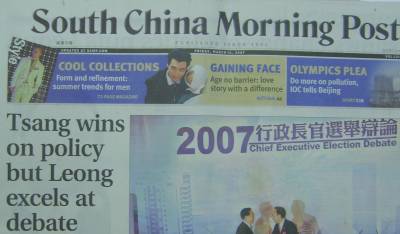
If the aim of yesterday’s Chief Executive election debate was to see who could produce the stalest, weakest, least inspiring and least imaginative policy platform, Donald Tsang was, as the South China Morning Post declares, the indisputable victor. From his opening pledge to spend billions on infrastructure to ‘create jobs’ it was obvious he was going to grind Alan Leong into the dust. Add to that the extra points Sir Bow-Tie scored for his supercilious grinning, and it’s a wonder the pink-tied barrister even bothered to show up.
Even compared with Leong, Donald doesn’t come close to qualifying as a politician. After 40 years in an environment where procedure is substance and independent thinking a weakness, he can’t handle criticism, debate or ideas. He is a one-trick bureaucrat – his favourite and only stunt being to leak misleadingly distressing news before issuing the less unpopular official proclamation.
As Leong could have said, “I knew Nicolo Machiavelli, Chief Executive, and you’re no Nicolo Machiavelli.”
In the spirit of a political debate with commercial breaks – a soap powder ad came before the bit about clean government – it seems appropriate to interrupt this diary entry with a plug for an old, classy Italian product of special interest to public figures...
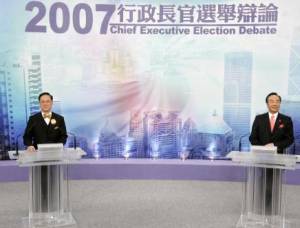
Machiavelli, The Prince, Chapter V
It was after Leong made this last point that Donald slipped briefly into some sort of trance-like state and recited what appears to have been a slightly weird pre-rehearsed comment. Did the phrase ‘high land price’ trigger it – as when Frank Sinatra flashed the queen of diamonds at Laurence Harvey in The Manchurian Candidate? Whatever the cause, Sir Bow-Tie refrained from disagreeing or condescending. He said (roughly), “Let’s not paint too negative a picture here. People outside Hong Kong [gestures, perhaps in a northerly direction] – our brothers in the Mainland – don’t know the whole picture and might get the wrong impression.”
Having watched Shenzhen TV on a few occasions, I am not totally flabbergasted to learn that some viewers across the border have been tuning in to these debates. And apparently someone primed Donald to refer to them in the event of – who knows? Drying up on camera? Leong stating an irrefutable but inadmissible truth? Or was he sending a coded message to his wife to put the dinner on? Or impulsively thinking ahead to the day he runs for PRC President? Most peculiar. Maybe I dreamt it – no-one else seems to have noticed.
RTHK don’t mention it this morning, but perhaps they are too busy trying to enunciate correctly. It was a momentous, uphill struggle for the announcers on the English-language radio service to learn how to pronounce ‘Tsang’. If we had universal suffrage there would be a small but real chance that they would have to start all over again and work out that ‘Leong’ is simply ‘leung’ not ‘leeyong’. The tycoons are not the only winners from this rigged ‘election’.
